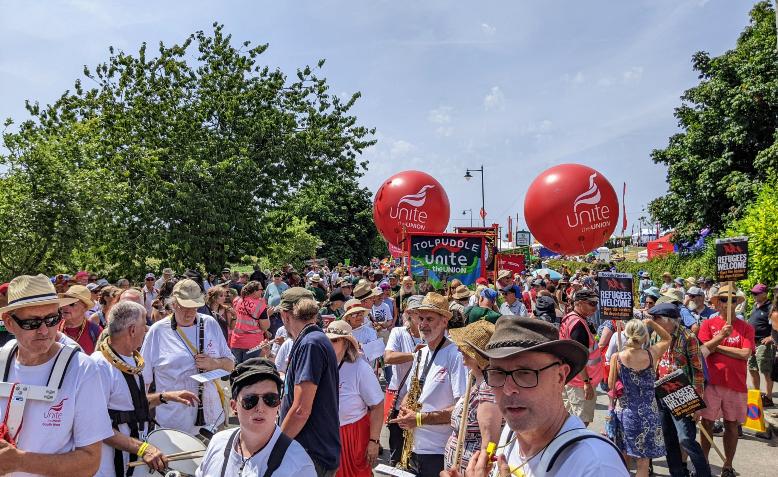 Tolpuddle Martyrs' Festival 2022. Photo: James Black
Tolpuddle Martyrs' Festival 2022. Photo: James Black
Figures such as Mick Lynch joined discussions and events at the labour movement festival after two years of pandemic hiatus
The Tolpuddle Martyrs’ Festival celebrated its post-pandemic return this past weekend. Numbers weren’t as high as previous years, which may partially be due to the lingering impact of Covid-19, but in any case, it was unlikely to have quite reached the huge sizes it had been enjoying under Jeremy Corbyn’s leadership of the Labour Party.
The festival – a traditional get-together hosted by the trade unions in the South West of England to commemorate the struggle and eventually victory of the Tolpuddle Martyrs, arguably the start points for modern British labour organising – consists of a mix of panel discussions, music, and cultural events. The attendees are overwhelmingly drawn from trade union activists and other allied campaigners, although in those big years prior to 2020 some slightly broader demographics had been going. The age range was reasonably wide, however.
The mood was certainly not downbeat. People were clearly glad to be back out and about again, and recent strikes, most notably by rail workers, contributed to a mood of a continuing struggle, rather that one of mourning. Despite sweltering temperatures at pretty much all times, panels were well attended, particularly where union leaders were appearing in person.

Mick Lynch of the RMT was a particularly big draw. His speech to a meeting on “Solidarity” focused on organising in the unions: calling for a “voluntary closed shop in every workplace” and for industrial strategies from unions that bring together different groups of workers (whether cleaners or train guards) and in-house and outsourced staff on an equal basis. Most applause was heard when he addressed the current crises of cost of living and Tory government, saying, “People are ready for a change… Trade unions need to take a lead!”
Political debate is not naturally at its sharpest at the festival, but there were some interesting points of discussion. A wing of the trade union left, notably Dave Ward of the CWU, are calling on the TUC to rise to the challenge of a period of struggle and potential growth (and the CWU is an example of a union taking major action at the moment), by extensively reforming itself, by focusing its structures more on organising, and by reinventing the position of General Secretary as a directly elected and term-limited one. This was echoed by local trades council activists, in addition to other leadership figures. There has been a real enough increase in struggle since the pandemic ended, and plenty of people were able to come to these meetings with good stories about what they’ve been involved with. Even for a relatively seasoned crowd such as this, the overall effect of this will have been positive.

What wasn’t particularly discussed was the Labour Party. Discontent with the Starmer leadership is widespread, to the point of being assumed. Despite the ongoing collapse of Boris Johnson’s premiership, the prospect of an oncoming general election is eliciting very little enthusiasm. This has the arguably positive effect of meaning that people are much more focused on bringing more workers into the movement and taking more industrial action over the cost-of-living crisis. However, it means that some big political questions basically go untalked about, because a lot of people still assume that these ultimately need an electoral solution.
The festival culminates each year with a traditional banner procession through the village, pausing at the 320-year old Tolpuddle Martyrs’ Tree to be addressed by Jeremy Corbyn among others. In the intense heat, the vibrant sounds of the RMT band brought energy to the parade, leading an array of beautiful rail union banners from the region and beyond.

Upon our return to the festival site for a final rally, the big speaker for the Labour Party was inevitably deputy leader Angela Rayner. She gave a characteristic rabble-rousing talk, full of promises that Labour would bring public services back into public ownership and finally scrap the Thatcherite anti-union laws. It went down well with the crowd, just before the last few bands came on to give the event a music close, but I did have to agree with a comrade who remarked to me that Rayner was really playing the role that John Prescott used to, under Tony Blair, 25 years ago.
Fund the fightback
We urgently need stronger socialist organisation to push for the widest possible resistance and put the case for change. Please donate generously to this year’s Counterfire appeal and help us meet our £25,000 target as fast as possible.

